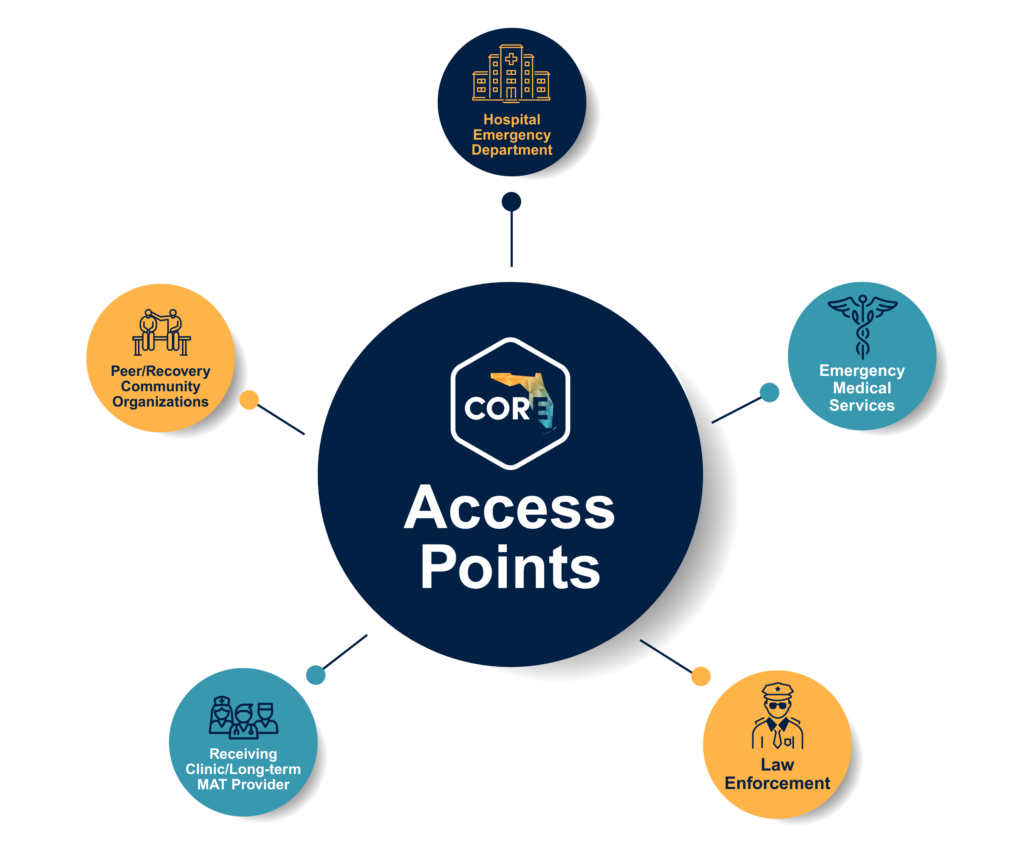For Individuals
Coordinated Opioid Recovery (CORE) Network is Florida’s statewide system for delivering comprehensive, long-term care to individuals with substance use disorder, including opioid use. It connects first responders, hospitals, treatment providers, and recovery services to ensure individuals receive continued care beyond the point of crisis.
CORE Networks provide immediate access to services such as medication-assisted treatment, mental health support, and recovery resources. This innovative approach emphasizes sustained recovery over short-term solutions. CORE Networks are helping Florida save lives, reduce overdoses, and strengthen communities.

- Multiple access points to streamline individual’s treatment and recovery.
- Immediate stabilization.
- 24/7 access to medication-assisted treatment.
- Individuals are connected to peers for warm hand-off to receiving clinic.
- Receiving clinics provide continuous long-term care for recovery by identifying and treating any other substance use disorders and behavioral health-related issues.
Substance use disorder occurs when the recurrent use of alcohol and/or drugs causes clinically significant impairment, including health problems, disability, and failure to meet major responsibilities at work, school, or home.
Medications can be used to manage withdrawal symptoms, prevent relapse, and treat co-occurring conditions.
Withdrawal: Medications help suppress withdrawal symptoms during detoxification. Detoxification is not in itself “treatment,” but only the first step in the process. Individuals who do not receive any further treatment after detoxification usually resume their drug use.
Relapse prevention: Individuals can use medications to help re-establish normal brain function and decrease cravings. Medications are available for treatment of opioid (heroin, prescription pain relievers), tobacco (nicotine), and alcohol addiction. Scientists are developing other medications to treat stimulant (cocaine, methamphetamine) and cannabis (marijuana) addiction.
Medication-assisted treatment services provide individuals struggling with substance use disorders access to medications, counseling, and behavioral therapies to support long-term recovery. Medication-assisted treatment helps manage withdrawal symptoms, reduce cravings, and prevent relapse, allowing individuals to focus on rebuilding their lives.
These services integrate medical and therapeutic support to improve long-term recovery outcomes. Common medications used in medication-assisted treatment include buprenorphine, methadone, and naltrexone for opioid use disorder. By combining medication with counseling, medication-assisted treatment enhances stability, increases treatment retention, and promotes overall well-being.
The goal of CORE is to support those with a structural foundation to recover from substance use disorder.
The CORE Network creates a support system that is overseen by an addiction medicine expert and continuously engaged in providing access to essential services to support long-term substance use disorder recovery, in addition to any underlying causes.
The Florida Department of Children and Families contracts for behavioral health services through regional systems of care called managing entities.
These experts stand ready to provide resources in your area available for substance use disorder.
For Partners
Those who seek treatment and recovery from substance use disorder with a prioritization for opioid use disorder have traditionally found themselves attempting to navigate siloed and fragmented social, medical, and behavioral health services in their communities. This fragmented approach has resulted in poor outcomes, recidivism, overdoses, and even death among those with the fewest resources and capability to know where to go to get the help they need.
The three main prongs of CORE are:
- First responders.
- Hospital emergency departments with skilled practitioners in addiction medicine.
- Treatment facilities that can assist the individual with long-term medication assisted treatment, primary care, and other psychosocial needs.
These entities work together in the community to create a seamless system of care, utilizing a warm hand-off approach from each entity by non-judgmental peer navigators. Individual’s care and treatment plans are always supervised by a physician.
This plan aims to provide non-CORE counties and communities with the tools to utilize existing treatment structures that can parallel CORE’s treatment model, simultaneously while the statewide program is being implemented.
If someone in a non-CORE county wants to seek help through a similar treatment model or work with community partners to establish a treatment program utilizing the steps outlined in the CORE Network Guide.
CORE Network Guide – This guide outlines all of the steps for implementing CORE and the results and lessons learned from the pilot launch in the state of Florida.